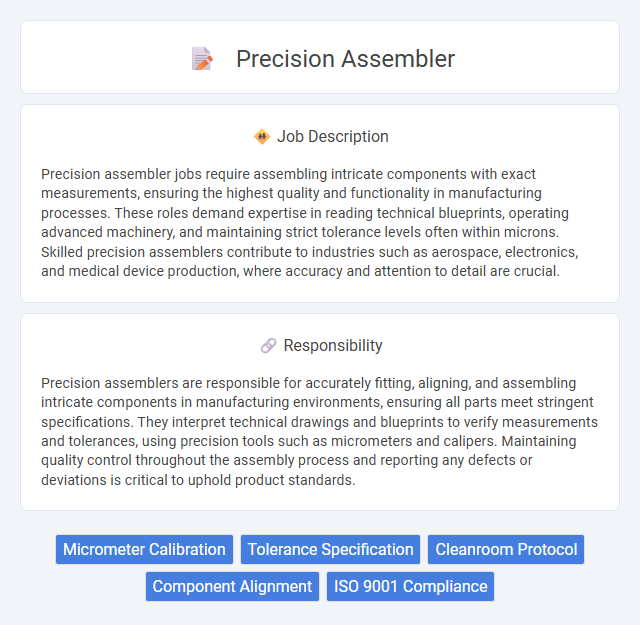
Precision assembler jobs require assembling intricate components with exact measurements, ensuring the highest quality and functionality in manufacturing processes. These roles demand expertise in reading technical blueprints, operating advanced machinery, and maintaining strict tolerance levels often within microns. Skilled precision assemblers contribute to industries such as aerospace, electronics, and medical device production, where accuracy and attention to detail are crucial.
Individuals with strong attention to detail and manual dexterity are likely to thrive as precision assemblers. Those who enjoy working with small components and can maintain focus during repetitive tasks might find this role suitable. People prone to fatigue or difficulty concentrating for extended periods may face challenges in this position.
Qualification
A Precision Assembler must possess strong technical skills and experience with detailed mechanical assembly tasks, including interpreting blueprints and using micrometers and calipers for accuracy. Key qualifications include a high school diploma or equivalent, proficiency in hand tools and electronic measuring instruments, and the ability to maintain strict quality standards while working with small components. Knowledge of safety protocols and good manual dexterity are essential for ensuring precise, high-quality assembly in manufacturing environments.
Responsibility
Precision assemblers are responsible for accurately fitting, aligning, and assembling intricate components in manufacturing environments, ensuring all parts meet stringent specifications. They interpret technical drawings and blueprints to verify measurements and tolerances, using precision tools such as micrometers and calipers. Maintaining quality control throughout the assembly process and reporting any defects or deviations is critical to uphold product standards.
Benefit
A Precision assembler job likely offers significant benefits such as the development of high-demand technical skills and the opportunity to work with advanced manufacturing technologies. Employees may experience improved job stability due to the specialized nature of the role and its importance in quality production processes. Competitive pay and potential for career advancement could also be probable advantages in this position.
Challenge
Precision assembler roles likely involve intricate tasks requiring high attention to detail and steady hands, posing considerable challenges in maintaining consistent quality under tight tolerances. The probability of encountering complex assemblies with varying components may demand strong problem-solving skills and adaptability to evolving production technologies. Precision assemblers might frequently face the challenge of balancing speed with exactness to meet demanding manufacturing deadlines.
Career Advancement
Precision assembler roles offer specialized skills in interpreting blueprints and assembling intricate components, leading to higher positions such as lead assembler or quality control supervisor. Mastery of precision tools and adherence to strict quality standards enhance opportunities for promotion within manufacturing and aerospace industries. Continuous skill development and certification in advanced assembly techniques significantly boost career growth and earning potential.
Key Terms
Micrometer Calibration
Precision assembler roles require expertise in micrometer calibration to ensure dimensional accuracy of components within tight tolerances. Proper micrometer calibration involves regular verification against gauge blocks and adherence to industry standards like ISO 17025 for measurement certification. Mastery in this skill enhances product quality, reduces assembly errors, and maintains consistent manufacturing precision.
Tolerance Specification
Precision assemblers specialize in constructing components with exact measurements, adhering to strict tolerance specifications to ensure functionality and reliability. Tolerance specification involves defining permissible limits of variation in part dimensions, critical for maintaining assembly integrity and preventing operational failures. Mastery of precision tools and interpretation of engineering drawings are essential to meet these stringent dimensional standards.
Cleanroom Protocol
Precision assembler roles demand strict adherence to cleanroom protocols to prevent contamination and ensure product integrity. Maintaining controlled environments with specific temperature, humidity, and particulate standards is critical while assembling sensitive components. Compliance with gowning procedures, tool sterilization, and contamination control practices optimizes yield and product reliability in industries like semiconductor manufacturing and biotechnology.
Component Alignment
Precision assemblers specialize in component alignment to ensure the exact positioning of parts within complex machinery, critical for optimal performance and mechanical integrity. They utilize advanced tools such as micrometers, calipers, and alignment jigs to achieve tolerances often within microns, preventing operational failures and enhancing durability. Mastery of blueprint reading and geometric dimensioning and tolerancing (GD&T) standards is essential for accurately interpreting design specifications and executing precise alignments.
ISO 9001 Compliance
Precision assemblers play a crucial role in manufacturing by ensuring products meet exact specifications and quality standards. Adhering to ISO 9001 compliance, these professionals implement systematic quality management practices to maintain consistent production processes. Their expertise supports the integrity of assembly operations, leading to enhanced product reliability and customer satisfaction.
 kuljobs.com
kuljobs.com